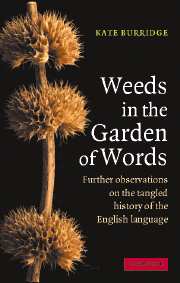Book contents
- Frontmatter
- Contents
- Acknowledgments
- Introduction to the Weedy Traits of the English Language
- Our Lexical Weeds: the World of Jargon, Slang and Euphemism
- More Lexical Weeds: Word Origins and Meaning Shifts
- Our Grammatical Weeds
- Weeds in Our Sounds and Spelling
- The Truly Nasty Weeds of the English Language?
- W(h)ither Our Weeds?
- Bibliography
- List of Interesting Words
W(h)ither Our Weeds?
Published online by Cambridge University Press: 22 September 2009
- Frontmatter
- Contents
- Acknowledgments
- Introduction to the Weedy Traits of the English Language
- Our Lexical Weeds: the World of Jargon, Slang and Euphemism
- More Lexical Weeds: Word Origins and Meaning Shifts
- Our Grammatical Weeds
- Weeds in Our Sounds and Spelling
- The Truly Nasty Weeds of the English Language?
- W(h)ither Our Weeds?
- Bibliography
- List of Interesting Words
Summary
The best ground bears weeds as well as flowers
AnonymousWeedy plants can damage our gardens and they're sometimes unsightly. More seriously, they can poison and injure livestock, contaminate produce, reduce crop yields, cut down on the productivity of pastures, choke out native species and clog up waterways. But the very same species can flourish attractively in wasteland areas and urban squalor. In some rural settings they can prevent the erosion of fragile soils in times of drought, serve as valuable fodder plants, supply nectar for honey production, enrich soils when rotted down, remove pollutants from domestic and industrial effluent and provide a much needed habitat for wetland wildlife. Clearly, weeds aren't intrinsically ‘useless, troublesome, or noxious’, to quote The Macquarie Dictionary, and their status changes according to local conditions. Essentially, if a plant becomes bothersome to us, then it is defined as a weed. In fact, some weed books suggest that every plant has a weed inside it, and given the right set of circumstances this weed will flourish.
And so it is with the weeds in our language. One speaker's noxious weed can be another's cherished ornamental plant. A linguistic weed today can be a valued garden contributor tomorrow. Whether they are in gardens or in languages, weeds are centred around human value judgements.
- Type
- Chapter
- Information
- Weeds in the Garden of WordsFurther Observations on the Tangled History of the English Language, pp. 182 - 185Publisher: Cambridge University PressPrint publication year: 2005



